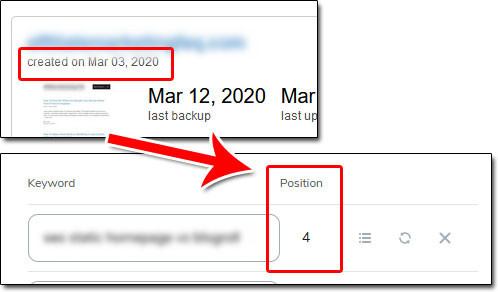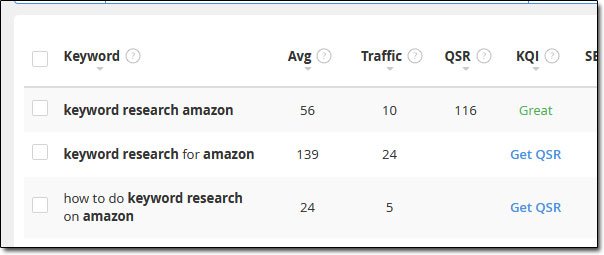Yesterday I wrote a blog post over at Wealthy Affiliate about a new website I recently launched which I managed to get to position 4 in Google within just a mere 10 days of setting it up.
Of course, everybody asked me how I did it – and I mentioned long-tail keywords.
But there was 1 common question among folks there, which was what is a long-tail keyword?
So in this post, I want to take a moment to explain exactly what a long-tail keyword is & why targeting them can help you skyrocket your business in a relatively short space of time.
What Is a Long-Tail Keyword?
In short, a long-tail keyword is a very specific phrase, usually three to four words long (but potentially longer) that targets something really specific related to the products/services that you’re promoting.
As an example, if I was promoting a SEO research tool I could indeed target the phrase “keyword research”, but as you can imagine that phrase would likely be pretty darn competitive.
In fact, according to the Jaaxy research tool, you can see that there are 197 websites competing for that exact phrase as shown below:

It’s not impossible to rank for that keyword, but it won’t be very easy – and even if you do manage to rank for it, “keyword research” is still pretty broad so you don’t know exactly what the visitor is actually seeking.
A better alternative?
Target a long-tail keyword.

As you can see from the Jaaxy results above the phrase “how to check keyword search volume” has only 29 websites targeting it – yet still receives an average of 56 searches per month.
56 searches may seem minuscule compared to the 3,920 searches for “keyword research”, but the deal here is that it will be VERY easy to rank on the first page for the lesser-competitive phrase.
And the other benefit is that you now know exactly what the searcher is wanting to do.
They want to check keyword search volume – so you can quite easily turn those visitors into profits by recommending something that can help.
…like Jaaxy for example.
How Targeting Long-Tail Keywords Can Skyrocket Your Business
I see it all the time, businesses chasing down highly competitive keyphrases in the hope that they can rank on the first & get a ton of traffic but in reality for the average Joe, it ain’t gonna happen.
At least not for a long time.
So what happens?
They get frustrated – they give up on SEO & instead try to throw money into paid advertising.
Bad move.
The solution is to simply just focus on long-tail keywords instead. They generally get completely ignored because people are too busy caught up focusing on the big traffic keywords.
That’s where you can sneak in, target the phrase & get ranked with ease.
Heck, in a single month if you managed to put out 1 quality post per day targeting a long-tail keyword by the end of the month you could quite easily be ranking well for all 30 of them & that’s no exaggeration.
Take a look at this website I recently launched for example:

I launched the website on the 3rd of March 2020 & by the 13th of March, 10 days later – 1 of the posts was ranked at number 4 on the first page of Google.
That’s the power of long-tail keywords, and you can read the full details on that site here.
So imagine starting a brand new business & targeting 30 long-tail keywords in month 1 with quality content.
By month 2 you could potentially have 30 posts sitting on page 1 of the search engines each receiving ~50 visits per month.
That’s 1,500 potential new customers by month 2.
Or alternatively, you could do it like most other people do & try to target the highly competitive “bigger traffic” keywords & sit on page 10+ of the search results receiving next to no traffic at all & feeling frustrated why the SEO thing isn’t working.
But remember, whilst 1,500 new customers sounds good on its own, the other added benefit is that you know exactly why every single one of those 1,500 people is arriving at your website.
You know exactly what to promote to them.
It’s such a powerful method & yet massively ignored method of marketing & it’s one I’d highly recommend you incorporate into your plan, which brings me onto my next point…
How To Find Long-Tail Keywords To Target
Here’s the beauty of it – finding long-tail keywords is actually super easy, and whilst it’s recommended to use a keyword research tool to help you find them, you don’t actually even need any tool at all.
Instead, you can just use the alphabet soup technique, as shown below:

The alphabet soup method simply involves you heading to Google, typing in your primary phrase & then running through the alphabet, letting Google provide you with suggestions.
Now, this method provides you with ideas, but as mentioned it’s best to use the help of a keyword research tool like Jaaxy so that you can then determine the search volume & competition.
Jaaxy will also provide you with more ideas, too.
So from there you can simply head to Jaaxy & type in some of the ideas you’ve found. As an example I’ve run a search on “keyword research amazon” as shown in the screenshot below:

Then it’s just a case of looking at the numbers & determining whether or not your time spent writing a quality article targeting the phrase will be worth it.
The higher the average traffic & the lower the QSR, the better.
QSR stands for Quoted Search Results, which shows how many pages are listed in Google containing that exact phrase. In the instance above there are 116 competing pages, which is probably a little too many for that low amount of average traffic.
But you shouldn’t write it off instantly – instead, head to Google and actually run the search. Who knows, all the websites currently ranked may be super low quality & easy to pass.
Take a look, determine their authority & then make a final decision.
And that’s it – hopefully, you found this article useful & hopefully it’s helped you see the huge benefit & potential of long-tail keywords. If you’d like to learn more, you can check out the in-depth training over at Wealthy Affiliate here.
